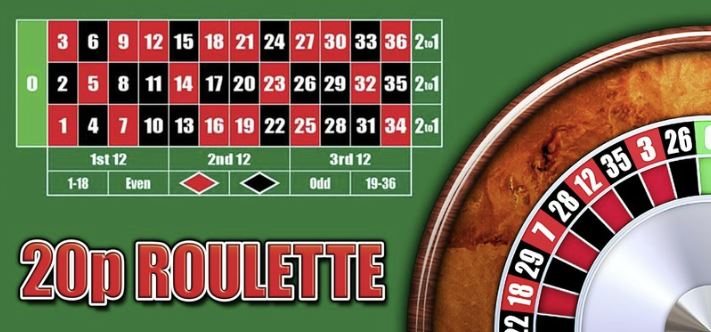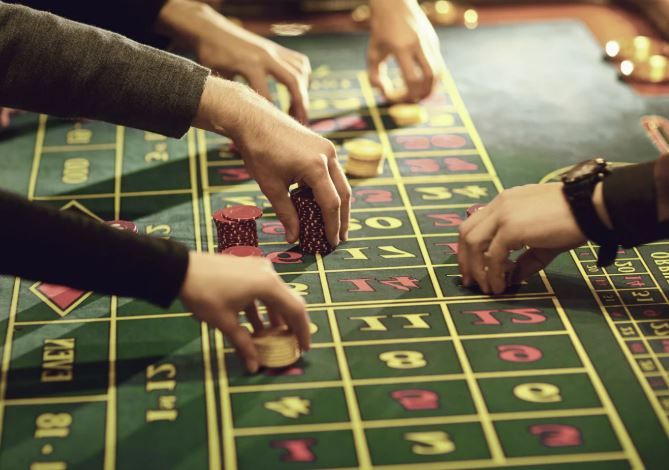This guide explores some common betting strategies used in 20p roulette, a low-stakes version of the game popular at many UK online casinos.
These strategies don’t guarantee wins, but they can help structure how you place your bets. This can help make the experience more organised for those who prefer a methodical approach when playing.
All strategies discussed here apply to European-style roulette with a single zero. This version gives you slightly better odds compared to American roulette, which has two zero pockets. Understanding how different roulette strategies work may help you feel more informed before deciding whether or not to play.
Martingale Strategy
The Martingale system is a type of progressive betting method. It’s usually used with even money bets — these are bets that can pay out at 1:1 odds, if successful. In roulette, these include red or black, odd or even, and 1–18 or 19–36.
Here’s how it works:
-
You start by placing a 20p bet.
-
If the spin doesn’t go your way, you double your next bet to 40p.
-
If you lose again, you double it again to 80p, and so on.
-
If you eventually win, you go back to the original 20p bet.
The idea behind Martingale is to try and recover all previous losses with one win. However, this strategy can lead to very high stakes quite quickly, and since roulette is a game of chance, winning is not guaranteed.
For example, after five consecutive losses, your next stake would be £6.40. Some roulette tables set a maximum bet limit, which can stop you from being able to double again. This method may require a large budget and isn't suited to every player.
Whittaker Progression Strategy
This system involves betting on even money outcomes, like red or black, just like the Martingale. However, the progression is based on adding the last two bet amounts together rather than doubling.
For example:
-
Start with 20p.
-
If you lose, your next bet is 20p again.
-
If you lose again, add the last two bets (20p + 20p) to place a 40p bet.
-
If you lose that, bet 60p (20p + 40p).
-
After a potential win, reduce your bet by moving two steps backwards in your own bet history.
This method is designed to try and make smaller gains over time. That said, the increase in bet sizes can still build quickly, especially after several losing bets in a row.
Players using this approach may reach table limits, or find themselves betting more than they are comfortable with. It's important to understand your own limits and stay within them.
It’s worth noting that this method isn’t widely known under the name "Whittaker" in the UK, and may be a variation or hybrid of better-known progression systems.
Number Tracking Strategy
Some players prefer to focus on the numbers themselves. This method involves keeping track of which numbers have appeared frequently and which haven’t.
Many roulette games, especially those played online, will show data on what are referred to as “hot” and “cold” numbers.
roulette games, especially those played online, will show data on what are referred to as “hot” and “cold” numbers.
-
Hot numbers are those that have appeared more often in recent spins.
-
Cold numbers are those that haven’t appeared for a while.
The idea is to place bets based on this information. For instance, you might choose to back a number that’s shown up often. However, this method is based on observation, not mathematics. Every spin is powered by a Random Number Generator (RNG) in online roulette games. That means the outcome of each spin is completely independent of previous results.
So, while this method may feel more active or entertaining, it doesn't improve your probability of winning. It is, however, a common way some players choose to approach 20p roulette games.
D'Alembert Strategy
This approach is named after a French mathematician and is one of the simplest structured betting methods. It’s again used with even money bets.
Here’s how it works:
-
Start with a 20p bet.
-
If the bet doesn’t win, increase your next stake by one unit — for example, to 40p.
-
If the next bet wins, decrease the stake by one unit — in this case, back to 20p.
This strategy is slower than the Martingale and doesn’t increase stakes as dramatically. That’s why it’s often used by players who want a more conservative progression. However, if there are more losses than wins, your total stake can still rise, and you might not recover all your losses. As with all structured systems, it can only shape how bets are placed — it doesn’t affect the outcome of the game.
Fibonacci Strategy
The Fibonacci sequence is a list of numbers where each number is the sum of the previous two: 1, 1, 2, 3, 5, 8, 13, 21, and so on. In roulette, this betting strategy uses those numbers to determine your stake amounts.
Here’s how it might look using 20p as your base unit:
-
First bet: 20p (1 unit)
-
If it loses: next bet is still 20p (1 unit)
-
If that loses: next bet is 40p (2 units)
-
If that loses: bet 60p (3 units), then £1 (5 units), and so on.
After each losing spin, move one step forward in the sequence. After a potential win, move back two steps. This makes the strategy slower than Martingale, and many players see it as less aggressive. However, like other progressive systems, your bets can still get quite large after a series of potential losses.
This strategy is also used only with bets that pay 1:1, such as red/black or odd/even. It isn’t usually suitable for bets on individual numbers.
Is There a Roulette Strategy That Actually Works?
All of the strategies mentioned here are simply different ways to manage how you place bets. They don’t improve your odds. Roulette outcomes are random, and the result of each spin is independent from the last. Even in games where previous results are displayed, this data doesn’t offer a way to predict future spins.
No betting method can change the house edge. For example, in European roulette, which includes one zero, the house edge is around 2.7%. This is built into the game by design. Some tables may also have different minimum and maximum bet limits, so it may be worth checking the game rules before you begin. This can help you understand if a particular strategy fits within those limits.
There’s also no such thing as the “best” or “worst” strategy. It all comes down to personal preference, how much you're willing to bet, and how you prefer to play. Some people like structured approaches; others prefer placing simple bets without a plan.
If you’re thinking about trying 20p roulette, take a moment to understand the game and how the odds work. All outcomes are random, so any strategy you use will only affect how you manage your bets, not whether you win or lose.
If you choose to gamble, make sure it’s only with money you can afford to lose. Set limits on time and spending, and don’t see it as a way to make money. For advice and support, visit BeGambleAware.org or call the National Gambling Helpline.
*All values (Bet Levels, Maximum Wins etc.) mentioned in relation to these games are subject to change at any time. Game features mentioned may not be available in some jurisdictions.
**The information provided in this blog is intended for educational purposes and should not be construed as betting advice or a guarantee of success. Always gamble responsibly.
